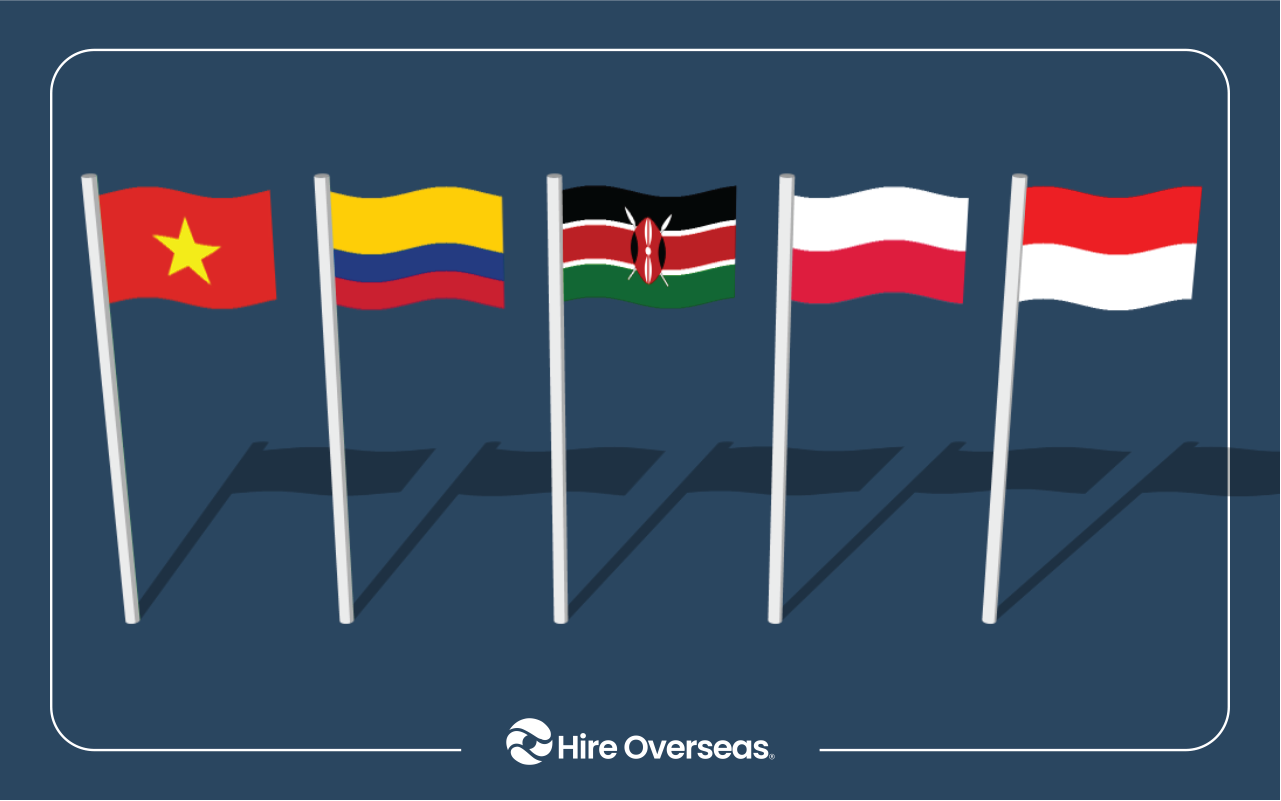5 Emerging Countries Dominating the Outsourcing Landscape in 2025

More and more, companies see outsourcing not just as something nice to have but as something essential for them to be competitive in the digital age. Once mainly a cost-cutting tactic, it has now become a way to tap into global talent pools, find the kinds of advanced technologies that they need, and achieve the sort of rapid scalability that is necessary in today's fast-paced digital world.
By 2025, outsourcing will reach into places not traditionally associated with it. Geopolitical changes, the adoption of remote work, and an improved global technological infrastructure will be behind this expansion.
This article highlights five developing nations likely to take charge of the outsourcing market by 2025. From vibrant technological epicenters in Asia to inventive centers in Latin America, these nations offer boundless potential for U.S. firms looking to reclaim some advantage in the increasingly globalized business terrain.
Choosing the right country is only part of the equation—how you structure and manage overseas teams ultimately determines success:
Vietnam – The Rising Tech Powerhouse

Strategic Government Initiatives and Infrastructure Investments
Vietnam's emergence as a prime tech outsourcing hub is driven by government initiatives designed to transform it into an innovation-centered economy. For instance, the government launched the National Digital Transformation Program, aiming to digitize public services and industries by 2025. Significant investments also include $820 million allocated for 5G infrastructure expansion by Viettel and VNPT, and initiatives like the establishment of software parks and technology zones such as Hanoi’s Hoa Lac Hi-Tech Park and Ho Chi Minh City’s Saigon Hi-Tech Park, which host international companies including Samsung, Intel, and Bosch.
Additionally, education programs such as the “Make in Vietnam” initiative foster local tech talent, enhancing Vietnam’s appeal as a leading outsourcing destination.
Rapid Growth of the IT Outsourcing Market
The Vietnamese IT outsourcing sector is seeing fast development. By 2025, revenues in the industry are estimated to be around $698 million, but by 2028 they are seen to increase to about $880 million, which is an almost 16.38% annual growth rate. If this pace continues, Vietnam may soon be in the league of the fastest-growing IT outsourcing powerhouses, able to hold its own against large established players such as India and China.
Highly Skilled and Growing Tech Talent Pool
One of the compelling advantages of Vietnam is its abundance of technical talent. Each year, around 100,000 skilled software developers and engineers join the labor pool, proficient in fields like mobile app development, artificial intelligence, and cybersecurity. This influx of skilled workers ensures that the talent pool is not only large but also of a high and consistent quality—that is, the quality necessary to meet the global demand for outsourced tech solutions.
Significant Cost Savings Without Compromising Quality
Besides a talented pool of people, Vietnam provides major cost benefits for international firms. It generally costs 30–40% less to employ software developers here than in go-to places like India and China, and productivity and quality seem to be just as good, if not better, in Vietnam. This makes Vietnam an exceptionally attractive hub for outsourcing.
Colombia – Gateway to Tech Talent in Latin America

Strategic Nearshore Advantage for North American Businesses
Emerging as a highly attractive outsourcing option for North American businesses, Colombia offers strategic nearshore advantages. Time difference? There is virtually none to speak of since these companies and their Colombian partners can be found working in the same or similar time zones (EST/CST). When not working from the same time zone, the companies Amazon, IBM, and Accenture, for instance, do a fine job of leveraging the real-time collaboration that a nearly situated Colombia affords.
Robust and Bilingual Tech Workforce
Colombia is gaining steady recognition for a highly skilled, bilingual workforce. Each year, the country produces upwards of 120,000 university graduates, with a large and growing portion specializing in technology-related fields that international companies increasingly rely on. These include courses related to software engineering, cybersecurity, and digital innovation.
Another benefit for foreign firms is bilingualism. Approximately 40% of the professional workforce is proficient in English and this obviously makes it much easier for companies from the United States and Canada, as well as other global entities, to communicate and collaborate with their Colombian counterparts.
Cost-Effective Alternative with High-Quality Outcomes
It is extremely cost-efficient to outsource to Colombia. In particular, this holds when you compare Colombia to the traditional outsourcing hubs of Latin America, such as Mexico, Brazil, and Argentina. On average, outsourcing to Colombia saves about 30 percent to 40 percent compared to these other Latin American nations.
These appealing cost efficiencies, along with Colombia's skilled labor and up-to-date infrastructure, seem to provide quite attractive motivations for companies seeking high-quality yet reasonably priced technology services.
A Thriving and Growing Tech Ecosystem
Colombia's administration fosters a dynamic tech environment with favorable policies and ample investments. The country's tech growth is fueled by initiatives like the "Orange Economy Law," which encourages creativity, innovation, and technological development. As a result, Colombia is ever more appealing as an outsourcing destination.
Kenya – Africa's Digital Frontier

Strategic Government Initiatives and Infrastructure Investments
Kenya is quickly revealing itself to be a key player in Africa's digital transformation in the years to come. Its emergence can be attributed to its heavy investments, both at the governmental and infrastructural levels, to make this happen.
Initiated by former President Uhuru Kenyatta back in November 2018, "Smart Kenya 2025" is set to up the ante on the digital revolution in the country. The plan covers aspects of cybersecurity and the establishment of smart city initiatives in Nairobi and Mombasa to lead the charge for the national vision.
Kenya is a data hub with its public sector almost entirely online, enabling access to most forms and services to the public. In this environment, laws have been enacted to ensure the protection of personal data. Kenya's data center market is seeing huge growth as well, in terms of infrastructure, with the upcoming capacity expected to reach 150 megawatts by 2028. Over 90% of this new power capacity is coming from Nairobi, which is leading the charge in this expansion.
Rapid Growth of the ICT Sector
Kenya's ICT sector is growing at an impressive slope. The sector is projected to reach USD 14.08 billion by 2029, growing at a compound annual growth rate (CAGR) of 5.91%. This growth shows the country's commitment to become a hub for digital innovation and outsourcing services.
Expanding and Youthful Tech Talent Pool
Kenya has a young population that is moving into a tech-savvy world - with a median age of just 20. This demographic is not only youthful but also increasingly capable of exerting the kind of technical skills that are essential for moving any economy into the digital age. These individuals form a vibrant tech talent pool that is exerting an influence on the ecosystem.
At present, the tech sector in the country employs approximately 300,000 individuals, and by the end of the year, we expect it to have grown another 15%.
Success Stories of International Tech Giants
Kenya's welcoming business environment and proficient workforce have drawn global technology companies. A prime example is Microsoft. In collaboration with UAE-based AI firm G42, the software giant has announced a $1 billion investment to build a data center in Kenya. This initiative aims to expand Microsoft's Azure cloud-computing services in East Africa. Microsoft will use the new cloud region to provide access to Azure and other cloud services to businesses across the region.
Furthermore, global firms, such as IBM and Safaricom, have set up substantial customer service functions in Kenya that serve both international and regional markets. One major European telecommunications firm that switched to a call center in Kenya reported that its customer service costs dropped by 45%, while its customer satisfaction scores climbed by 12%.
Poland – Europe's Hidden Tech Gem

Elite Software Development Talent
Poland has established a very strong position as a top-notch place for exporting software development talent. According to HackerRank's global rankings, Polish developers are among the top three in the world and are the highest ranked in Europe. This excellence is underpinned by a very strong educational system that produces a large number of STEM graduates, who are very skilled and go to work in tech.
Poland's major urban centers such as Warsaw, Kraków, and Wrocław are burgeoning technology metropolises, with fast-growing ecosystems of tech startups and established firms. They are home to over 600,000 IT professionals.
Significant Cost Advantages
IT services can be outsourced to Poland at a considerable savings compared to the U.S. and Western Europe. The fees for services are about 30% less than in the U.S. and 20-25% less than in Western European countries. Despite this, the quality of work has not suffered. If anything, it would seem that Polish developers are as good, if not better. This makes Poland an attractive option for companies seeking efficient and economical software development talents.
Thriving Sectors: Fintech, Cybersecurity, and Beyond
The outsourcing business in Poland does well when it comes to sectors like fintech, cybersecurity, and software development. Poland's fintech sector is especially strong, with a creative and growth-friendly ecosystem that sets it apart from the competition. When it comes to cybersecurity, Poland is on the upswing, and investments from global tech behemoths like Microsoft and Google are amplifying the nation's capabilities and infrastructure
Success Story: Fexco's Strategic Partnership
Poland's outsourcing prowess is evident in the partnership between the Irish fintech firm, Fexco, and Polish engineers. For over five years, Fexco has worked with more than 25 Polish developers to modernize its technology stack and build a cutting-edge, digital product. Fexco and its Polish team are a testament to the reliability and expertise of Poland's tech talent. This partnership has been ongoing for over five years, highlighting the reliability and expertise of Poland's tech professionals.
Poland's unique combination of sectoral strengths, a talented workforce, and a cost-effective business environment makes it one of the most promising outsourcing locations within Europe.
Indonesia – Asia’s Next Outsourcing Hub

The world's fourth most populous country, Indonesia, is rapidly positioning itself to become a significant player in the global outsourcing industry. With more than 129 million people in its labor force, a youthful demographic, and a digital economy reaching for the stars, the country seems well-poised to attract the kinds of foreign investment that will beef up its tech and outsourcing sectors.
Massive Labor Force and Tech-Savvy Population
The labor force of Indonesia, which is largely made up of people younger than 40, is a digital force of nature. This massive, youthful population is rapidly adopting new technologies, which is a beautiful thing not only for Indonesia's goal of being a digital innovation hub but also for its educational institutions, which are churning out the third-most number of STEM graduates in the world - with over 300,000 annually. With this combination of a young, exponentially growing population and a robust, homegrown digital ecosystem, Indonesia has the strong potential not only to meet the demands of a thriving digital economy but also to export tech talent to the rest of the world.
Competitive Labor Costs
The competitive labor costs are one of the most appealing features of Indonesia for businesses. When put up against neighboring nations like the Philippines and India, Indonesia is a far more affordable alternative for outsourcing. Yet, despite its low pricing. The nation's workforce is far from unskilled - with the combination of cheap and knowledgeable labor, it makes Indonesia one of the best destinations for businesses looking to find quality service at reduced prices. In a period when many firms are trying to find ways to cut costs, Indonesia's abundant and skilled labor pool has made it a naturally attractive choice for outsourcing.
Rapid Growth of the Digital Economy
Indonesia's digital economy is growing incredibly fast, seen to be worth more than $130 billion by 2025. This makes it one of the two fastest-growing digital economies in the region, next only to Vietnam. The principal engine of this growth is surely the incredible increase in internet penetration in Indonesia. This is pushing more and more people toward a range of internet-based activities, including digital banking and other online services. Meanwhile, e-commerce is expanding at a phenomenal pace, driven largely by the younger population. All this is further supported by government policies that are working to promote digital innovation.
Government Initiatives and Infrastructure Development
Indonesia's government is very active in developing the digital world, where companies like Microsoft can invest in the relatively untapped market. By moving there, these companies can set up infrastructure that can support not only Indonesia but the entire Southeast Asian region. Microsoft is committing $1.7 billion to build out infrastructure in Indonesia. Its investment is especially in artificial intelligence and cloud computing, which are moving into the mainstream in terms of digital transformation. In addition to providing the necessary infrastructure, Microsoft is also committed to performing an extensive skills gap analysis. Understanding the skills gap that exists in the digital world will better enable Microsoft to help close that gap.
Expert Insight
Experts in the industry recognize the growing prominence of Indonesia in the outsourcing sector. A report by Outsource Asia states, "Indonesia's strategic location, coupled with its large, young, and tech-savvy workforce, positions it as a compelling destination for outsourcing services in the Asia-Pacific region." This acknowledgment from experts in the industry really underscores the potential of this country to become a leading player in the global outsourcing industry.
Merging a huge labor supply, competitive cost, fast-growing digitization, and supportive government policies, Indonesia is a rising star in global sourcing. As it builds a digital nation with its young, educated populace, expect it to join the ranks of large, high-quality outsourcing destinations in the Asia-Pacific region.
Trends and Predictions for 2025 and Beyond

As we move deeper into the decade, many key global trends will significantly influence outsourcing choices and methods.
Political Shifts Creating New Outsourcing Opportunities
Changes in global politics are continuing to realign established business paths. From these changes, the world of outsourcing is now witnessing a fresh wave of opportunity across emerging outsourcing nations. This new opportunity is being led, in part, by the attractiveness of these nations as politically stable alternatives in a world where risk seems to be multiplying along various fault lines. Both multinational corporations and small and medium-sized enterprises are diversifying their outsourcing bases in response to risk factors that have this recent wave of opportunity in fast-growing economies.
AI and Automation Redefining Outsourcing Models
Swift advancement in technology, particularly artificial intelligence and automation, is set to change the very nature of outsourcing. Firms will integrate AI far more extensively into their operations, and many will be on the hunt for productivity gains like those we experienced with the internet. Adaptability to and integration with the latest tech will become table stakes for outsourcing destinations. Countries that are pumping money into digital infrastructure and AI training will be the most relevant tech outsourcing players.
Remote Work Expanding the Global Talent Pool
Furthermore, the worldwide acceptance of remote and hybrid working models keeps breaking apart geographical boundaries, allowing previously neglected areas to come into play. The countries businesses select today for their operation centers are those that offer flawless digital collaboration and are mostly within reach of the time zones from their central offices. Favoring places with a strong digital backbone, this same trend has opened up the direct access required to leverage the kinds of talent sitting in the very well-educated, digitally astute environments that places like Colombia and Kenya now offer.
Demand for specialized talent will increase as companies forcefully push for niche capabilities in fintech, cybersecurity, and AI industries. In the future, countries with specialized educational programs and training initiatives will dominate the BPO growth and will be in a very nice place to sit in the outsourcing space. This enforces the fact that we have to invest proactively in our workforce.
Strategic Agility Will Define Outsourcing Success
In the end, the future landscape for outsourcing will favor firms that take a well-thought-out approach, put a premium on adaptability, and follow an "act first, ask questions later" strategy in tapping the new global talent pool.
Unlock Global Talent with Ease
Hire Overseas streamlines your hiring process from start to finish, connecting you with top global talent.
Unlock Global Talent with Ease
Hire Overseas streamlines your hiring process from start to finish, connecting you with top global talent.





